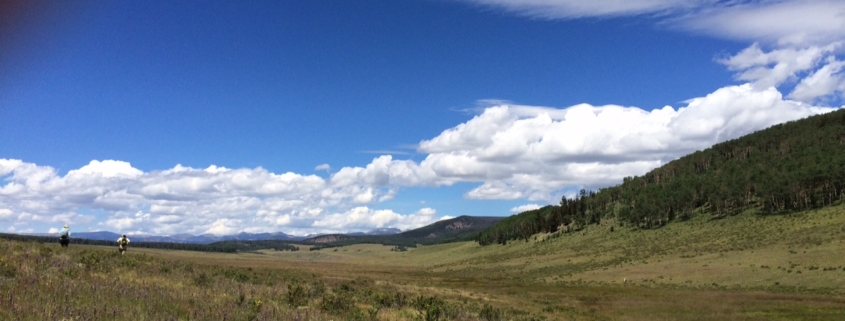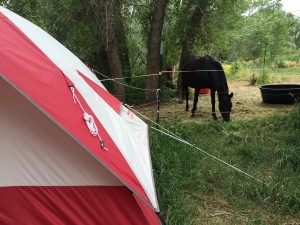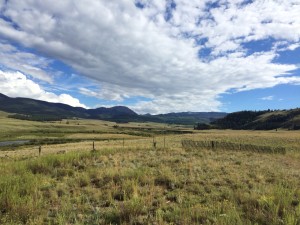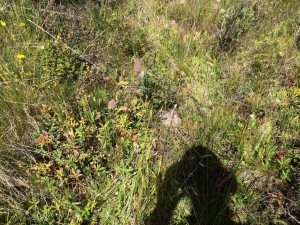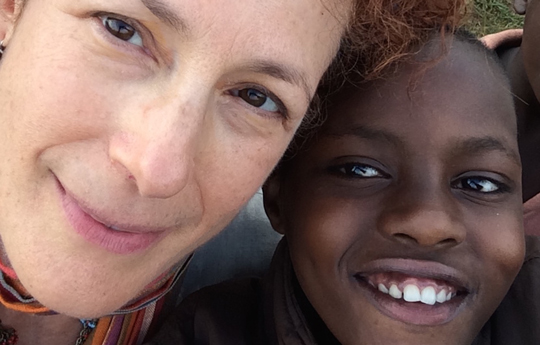Slowing Down #2 – Being Quiet
A few nights ago, I was on my way from Denver to Creede, Colorado. I arranged to sleep in a little red Coleman tent on the grounds of a farm just outside Salida, about midway between. I found it on Airbnb. It cost thirty-four dollars.
The rain graciously waited to start until I zipped up and tucked in. The sky on my walk from the bathroom in the house had been huge and clear and dotted with stars, with no trace of the clouds that unleashed the sudden downpour that continued intermittently throughout the night.
I didn’t sleep at all, for listening. There was the soft drumming of the rain, and then there was the quiet.
I heard a whoosh as some small critter scurried by my side of the tent, inches from my pillow.
There were crickets. More rain. More quiet.
* * *
Last month, I wrote about slowing down, taking the bus, letting go of control. This month, I’m interested in quiet and the space it opens for creation.
In On Writing, Stephen King talks about the writer’s relationship with her muse. He imagines his muse as a burly man for whom he has built a basement apartment. His muse hangs out there underground, smoking cigars and polishing his bowling trophies.
The writer’s job, King says, is to keep regular working hours in a prescribed place. That way, in the rare event the stubborn muse has any inclination to ascend, he-she-it-they-ze knows where to find you.
So I was lying there in that tent. I was supposed to be sleeping, but I couldn’t sleep. I made a conscious decision not to listen to music, not to read my novel, not to fill the emptiness. I lay still, listening to the rain and the critters, trying to figure out if that thing tickling my nose was a strand of hair. Or was it a spider?
Hey, muse, I thought, whoever you are. I’m here in this little red tent. Come get me.
At the center of King’s good book—along with a call to diligence and dependability—is an invitation to mysticism and magic. It’s not exactly what I expected from a guy who churns out novels like he does.
Quiet. Silence. Stillness that leaves room for the muse to enter.
* * *
Creede is a silver mining town in the southern part of the state. The closest you can get to Creede by plane, train, or bus is Alamosa, a couple of hours away. You can’t rent a car in Alamosa, so I came in through Denver, which is five hours away, including the down, up, and around you have to do to get between rocks spewed by ancient volcanoes. There is no getting to Creede as the crow flies, unless you’re a crow. Or you have steel wings of your own, which a handful of summer Creedites do.
The mines closed for not-so-good in 1986, leaving the place barren and deeply poor, except for the Creede Repertory Theatre. The theatre and the folks it drew to Creede pretty much saved the town.
My director Pam Berlin worked at the theatre in the seventies. She wound up buying a summer house about ten miles out of town. I was on my way to Creede to work with Pam on the final draft of a solo play I was commissioned to write in Israel. It took me a long time to figure out what I had to say about the time I spent there during the Second Intifada.
Pam is based back in New York; I’m in LA. Creede is a good middle ground. It’s also big-sky fierce and full of ear-splitting quiet.
* * *
At the beginning of every new year, at the opening of every new project period, I make a vow to give myself regular writing hours, but something always comes up. I get the work done. I meet my deadlines. I fulfill my obligations.
But I find myself longing for the kind of structure King prescribes, designed to open the possibility of bringing forth work that is more than the sum of narrative and presumed meanings.
Inviting the muse. Alchemy.
* * *
The first morning in Creede, Pam and I took a six and a half-mile walk with friends and dogs up a hill in the direction of an abandoned saw mill. We were at about ten thousand feet. Unaccustomed to the altitude, I struggled to breathe as we hiked through vast fields, intricate with miniature wildflowers.
As we approached the mill, I fell behind as Pam and the others forged onward. Without their company and conversation, I became aware of the soundscape of breathing and the bees and the wind. Quiet. I saw Pam about a hundred feet ahead, waving her arms, clearly shouting to me. She has a good strong voice, trained to travel. I couldn’t hear her. The thin, clean air, the hollow of the valley surrounded by peaks swallowed her voice completely.
Alone, but not alone. Hey, muse, here I am. Come get me.
The strong sun. The dense flora at my feet. At that height—with that heat, that aridity—all that survive are fine grasses, those delicate flowering things. One reddish grass was nearly invisible when seen from above, but the many of those insubstantial wisps miraculously caught the light when seen en masse, transforming the field into a shimmering ocean of pink and green.
Disparate strands coming together, gorgeous and unexpected.
* * *
Looking back: Lori, the Airbnb host who rented me the red tent in Salida, sent a text saying she would not be around when I got there the other day. Don’t worry, she said, her son Kenny promised he’d be there at four to show me around.
When I arrived at the farm, I followed the road to the house, a big do-it-yourself log affair. I banged on the door, peered through the windows. No one was there.
I cruised around, finally found that red tent from the photo online. As I approached, a black horse sauntered over, offered me her nose through the wire fence. There was a llama on the ground behind the horse who could not be bothered to even look up when I said hello.
I shouted for Kenny, the son who was supposed to be there to greet me. Goddammit. I had to pee. Where was the fucking bathroom?
It was crazy. Here was a tent, a horse, a llama, a blue cloud-smeared sky. There was no one around. I could have peed behind a tree, or out in the open. How sweet would that have been?
But I flew to irritation, aggravation, rage against injustice. The promised Kenny was not there. I was being ripped off. Thirty-four dollars. Noise.
Heche en Nu Yorica. That’s how I’m wired.
Defaults aside, it takes intentionality and practice to carve out time and space within which we pay a different kind of attention, apply an uncharacteristic sort of patience, exercise a different kind of doing.
Time and space to be quiet, like that silent, apparently oblivious, low-lying llama.
I wonder, might he be my muse?
Stacie Chaiken is a Los Angeles-based writer-performer. A Fulbright Senior Specialist in the field of Performance and Story, she facilitates What’s the Story? a Los Angeles-based studio for writers and performers who are wrestling with personal story. Her play “The Dig” will premiere at Los Angeles Theatre Center in the spring of 2016. She is currently studying creative nonfiction in the Antioch MFA Creative Writing program.

